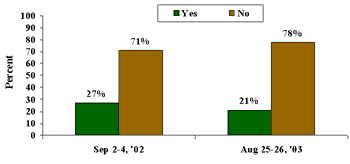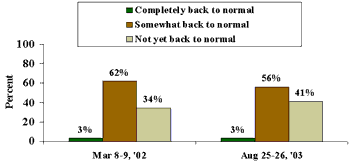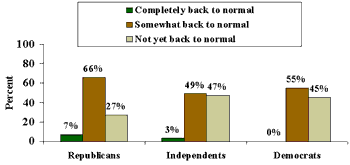GALLUP NEWS SERVICE
PRINCETON, NJ -- Two years after the 9/11 terrorist attacks brought down the World Trade Center towers, damaged the Pentagon and killed an estimated 3,026 people, Americans are reluctant to say the United States is back to normal. According to a recent CNN/USA Today/Gallup poll, a majority believes things are "somewhat" back to normal but only 3% say things are "completely" normal. Just one in five Americans (21%) told Gallup in the Aug. 25-26 survey that time has healed the country's Sept. 11 wounds.
Ironically, people are less likely to say time has healed the country's wounds today, at the second anniversary of 9/11, than they were at the first anniversary. Last September, 27% believed the nation's wounds had healed, compared with 21% today.
| 9/11: Has Time Healed the Country's Wounds? |
 |
Even six months after the attacks, Americans were more likely than they are today to say the nation was at least somewhat back to normal: 65% in March 2002 vs. 59% now.
| 9/11: The Nation's Recovery |
 |
Men and women have similar perspectives on these questions, as do Americans of various ages. The sharpest differences are by political affiliation, with Republicans much more likely than political independents and Democrats to have a positive assessment of the nation's recovery. Three-quarters of Republicans, but barely half of independents and Democrats, say things are either completely or somewhat back to normal.
| 9/11: The Nation's Recovery By Political Party |
 |
| Aug. 25-26, 2003 |
Similar partisan differences are not seen, however, in respondents' answers to whether or not time has healed the nation's wounds.
Fear of Terrorism Remains Elevated
Perhaps the most relevant indicator of normalcy in the lives of Americans on the matter of 9/11 is fear of terrorism. Two years ago today, on the evening of Sept. 11, 2001, a special Gallup Poll found nearly 6 in 10 Americans feeling very or somewhat worried that they or another family member would become a victim of terrorism. Today, this figure is much lower, at 41%, but is still not as low as in the last Gallup reading on this measure taken prior to 9/11, when only 24% were worried.
|
Pre-9/11: |
|
First anniversary: |
Most recent: |
|
|
% |
% |
% |
% |
|
|
Very worried |
4 |
23 |
8 |
11 |
|
Somewhat worried |
20 |
35 |
30 |
30 |
|
Not too worried |
41 |
24 |
37 |
33 |
|
Not at all worried |
34 |
16 |
25 |
26 |
|
No opinion |
1 |
1 |
* |
* |
|
Total very/somewhat worried |
24 |
58 |
38 |
41 |
|
* Less than 0.5% |
||||
On this basis alone, it is clear the nation has not fully recovered from the horror of terrorism almost all Americans experienced, at least through television, on Sept. 11, 2001. However, frequent polling on this measure between 9/11 and today shows that there has been significant variation in the level of Americans' fear of terrorism from month to month. This variation is largely related to specific news events that have occurred since 9/11, such as the anthrax attacks in September and October 2001, periods during which the government raised the terrorist threat level in 2002, the war in Iraq in 2003, and the recent terrorist attacks on U.N. forces in Iraq.
A gallup.com news story in late September 2001 noted, "Since the morning of Tuesday, September 11, Americans have been consumed in many ways by the events of that day. Ongoing polling by CNN/USA Today/Gallup reveals how Americans have been coping ever since, and how the attacks are likely to affect their lives in the future."
- In September 2001, 77% of Americans told Gallup they had been following news about the attacks "very closely," and another 20% were following it "somewhat closely," making this the most closely watched news event Gallup has ever recorded.
- Eighty-one percent said they were keeping their radios and televisions tuned in to the news and 46% were reading newspapers more closely.
- Seventy-one percent of Americans said they felt depressed by the attacks, 70% said they cried, 74% reported having prayed or planning to pray more, and 77% said they had shown or would show greater than normal affection for a loved one.
- Close to half of Americans, 49%, reported having difficulty concentrating on their job or normal activities.
- One-third of Americans reported having difficulty sleeping.
Survey Methods
These results are based on telephone interviews with a randomly selected national sample of 1,009 adults, aged 18 and older, conducted Aug. 25-26, 2003. For results based on this sample, one can say with 95% confidence that the maximum error attributable to sampling and other random effects is ±3 percentage points. In addition to sampling error, question wording and practical difficulties in conducting surveys can introduce error or bias into the findings of public opinion polls.
9. How worried are you that you or someone in your family will become a victim of terrorism -- very worried, somewhat worried, not too worried, or not worried at all?
|
|
Some- |
|
Not |
KNOW A |
|
||
|
% |
% |
% |
% |
% |
% |
||
|
2003 Aug 25-26 |
11 |
30 |
33 |
26 |
* |
-- |
|
|
2003 Jul 18-20 ^ |
6 |
24 |
38 |
32 |
* |
* |
|
|
2003 Apr 22-23 ^ |
8 |
26 |
39 |
26 |
* |
1 |
|
|
2003 Mar 22-23 |
8 |
30 |
38 |
24 |
-- |
* |
|
|
2003 Feb 17-19 |
8 |
28 |
33 |
31 |
* |
-- |
|
|
2003 Feb 7-9 ^ |
13 |
35 |
34 |
18 |
* |
* |
|
|
2003 Jan 23-25 |
8 |
31 |
36 |
25 |
-- |
* |
|
|
2002 Sep 2-4 |
8 |
30 |
37 |
25 |
* |
* |
|
|
2002 May 28-29 |
9 |
31 |
37 |
22 |
1 |
* |
|
|
2002 Apr 22-24 |
8 |
27 |
39 |
25 |
1 |
* |
|
|
2002 Mar 4-7 |
12 |
33 |
32 |
23 |
* |
* |
|
|
2002 Feb 4-6 ^ |
8 |
27 |
39 |
25 |
-- |
1 |
|
|
2001 Nov 26-27 |
8 |
27 |
34 |
30 |
1 |
* |
|
|
2001 Nov 2-4 |
11 |
28 |
34 |
26 |
-- |
1 |
|
|
2001 Oct 19-21 † |
13 |
30 |
33 |
23 |
* |
1 |
|
|
2001 Oct 11-14 † |
18 |
33 |
35 |
14 |
* |
* |
|
|
2001 Oct 5-6 † |
24 |
35 |
27 |
14 |
* |
* |
|
|
2001 Sep 21-22 † |
14 |
35 |
32 |
18 |
* |
1 |
|
|
2001 Sep 14-15 † |
18 |
33 |
35 |
13 |
* |
1 |
|
|
2001 Sep 11 † ‡ |
23 |
35 |
24 |
16 |
1 |
1 |
|
|
2000 Apr 7-9 ^ |
4 |
20 |
41 |
34 |
-- |
1 |
|
|
1998 Aug 20 ‡ ? |
10 |
22 |
38 |
29 |
-- |
1 |
|
|
1996 Jul 20-21 ‡ |
13 |
26 |
34 |
27 |
-- |
* |
|
|
1996 Apr 9-10 ? |
13 |
22 |
33 |
32 |
-- |
* |
|
|
1995 Apr 21-23 ? |
14 |
28 |
33 |
24 |
-- |
1 |
|
|
^ |
Asked of a half sample. |
||||||
|
† |
WORDING: How worried are you that you or someone in your family will become a victim of a terrorist attack -- very worried, somewhat worried, not too worried, or not worried at all? |
||||||
|
‡ |
Based on one night poll of national adults with a margin of error of ±4 pct. pts. |
||||||
|
? |
WORDING: How worried are you that someone in your family will become a victim of a terrorist attack similar to the bombing in Oklahoma City? |
||||||
|
? |
WORDING: How worried are you that you or someone in your family will become a victim of a terrorist attack similar to the bombing in Oklahoma City? |
||||||
|
* |
Less than 0.5% |
||||||
|
(vol.) |
Volunteered response |
||||||
13. Generally speaking, do you think that things in the country are -- [ROTATED: completely back to normal, somewhat back to normal, but not completely, or not yet back to normal]?
BASED ON -- 514 -- NATIONAL ADULTS IN FORM A
|
Completely back to normal |
Somewhat back to normal |
Not back |
No |
||
|
2003 Aug 25-26 ^ |
3% |
56 |
41 |
* |
|
|
2002 Mar 8-9 |
3% |
62 |
34 |
1 |
|
|
* Less than 0.5% |
|||||
|
^ |
Asked of a half sample. |
||||
14. Would you say that time has healed the wounds of the country that were caused by September 11th, or not?
BASED ON -- 495 -- NATIONAL ADULTS IN FORM B
|
Yes |
No |
No opinion |
||
|
% |
% |
% |
||
|
2003 Aug 25-26 ^ |
21 |
78 |
1 |
|
|
2002 Sep 2-4 |
27 |
71 |
2 |
|
|
2002 Mar 8-9 |
24 |
74 |
2 |
|
|
^ |
Asked of a half sample. |
|||
